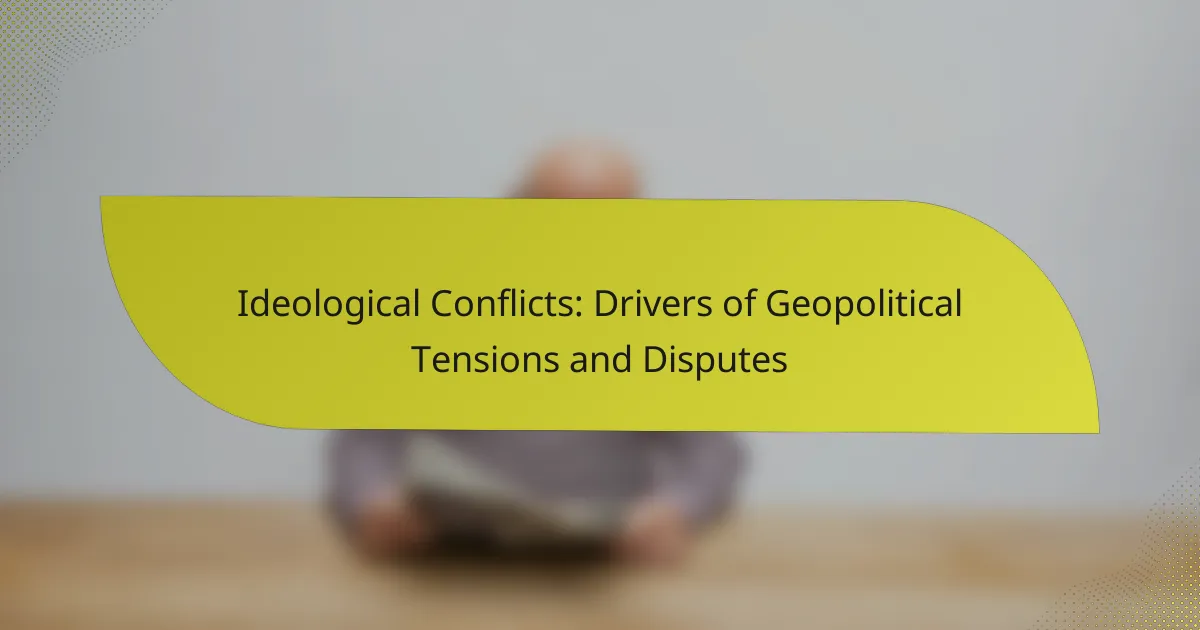Ideological conflicts serve as powerful drivers of geopolitical tensions, rooted in the beliefs and values that shape national identities. These conflicts often arise from disputes over nationalism, religion, economics, history, and ethnicity, leading to significant implications for international relations and global stability. As these tensions escalate, they can result in violence, political strife, and humanitarian crises, perpetuating a cycle of instability that affects nations and their populations.
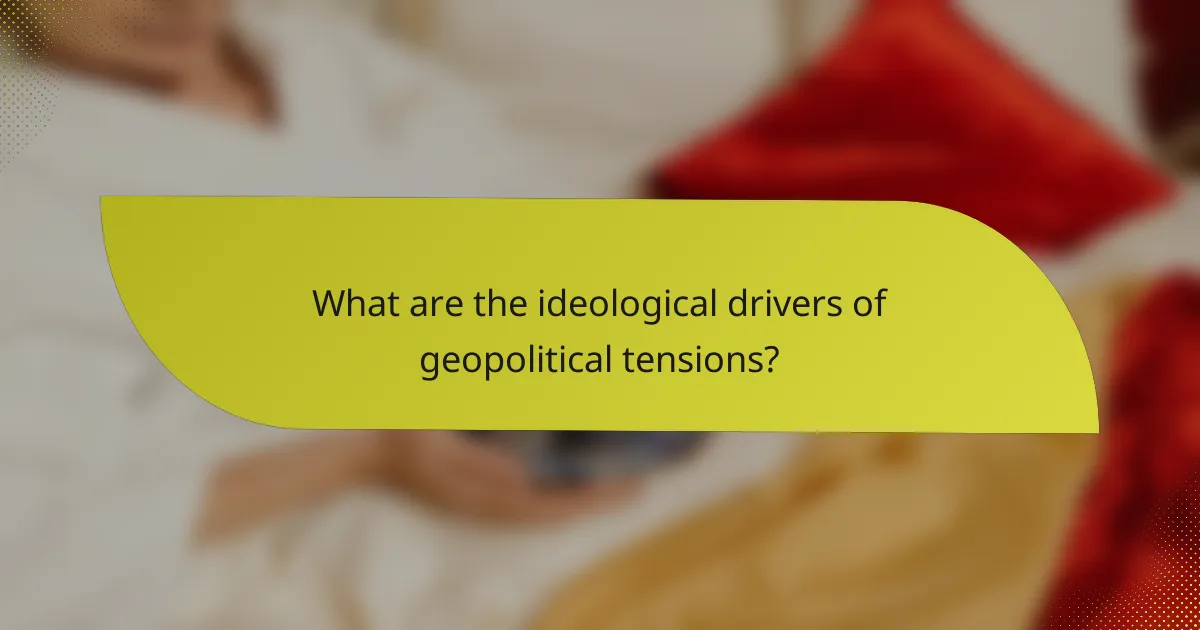
What are the ideological drivers of geopolitical tensions?
Ideological drivers of geopolitical tensions include beliefs and values that shape national identities and influence international relations. These drivers often manifest in conflicts over nationalism, religion, economics, history, and ethnicity, leading to disputes between nations and groups.
Nationalism as a conflict driver
Nationalism can lead to geopolitical tensions when groups prioritize their national interests over global cooperation. This often results in aggressive foreign policies, territorial disputes, and a reluctance to engage in diplomatic negotiations.
For example, the rise of nationalist movements in various countries has led to increased tensions in regions like Eastern Europe, where historical claims and national pride fuel disputes over borders and governance.
Religious extremism influencing disputes
Religious extremism can exacerbate geopolitical tensions by promoting intolerance and conflict between different faiths. Groups that adopt radical interpretations of their beliefs may engage in violence, leading to broader regional instability.
In the Middle East, for instance, sectarian violence between different religious communities has often been a catalyst for conflict, complicating peace efforts and international relations.
Economic disparities fueling tensions
Economic disparities between nations can create resentment and competition, leading to geopolitical tensions. When wealth is unevenly distributed, countries may engage in aggressive trade practices or military posturing to secure resources.
For example, the economic divide between developed and developing nations often results in conflicts over trade agreements, access to markets, and resource exploitation, which can escalate into larger disputes.
Historical grievances impacting relations
Historical grievances can linger for generations, influencing current geopolitical tensions. Nations may harbor resentments based on past conflicts, colonization, or territorial losses, which can hinder reconciliation efforts.
For instance, the historical animosities stemming from World War II continue to affect relations in Europe and Asia, with countries often revisiting past injustices in their political discourse.
Ethnic conflicts exacerbating disputes
Ethnic conflicts often arise when different groups vie for power, recognition, or resources within a nation. These tensions can spill over borders, leading to regional instability and international disputes.
In regions like the Balkans and parts of Africa, ethnic divisions have resulted in violent conflicts, prompting international intervention and complicating diplomatic relations among neighboring countries.
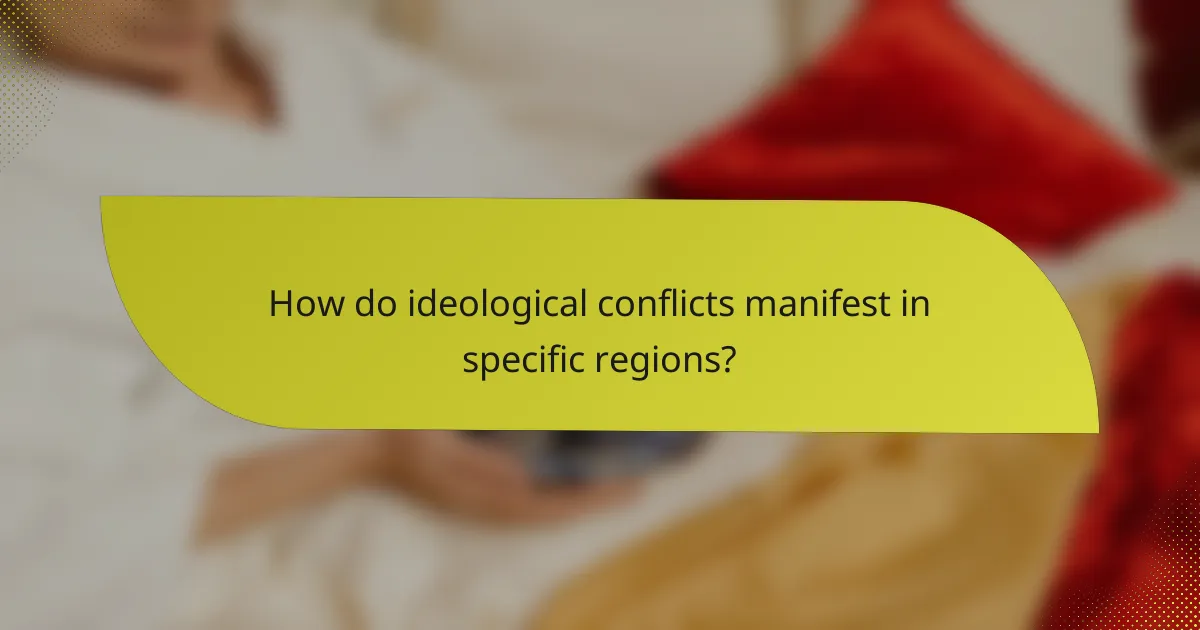
How do ideological conflicts manifest in specific regions?
Ideological conflicts often emerge as deeply rooted tensions shaped by cultural, religious, and political beliefs, leading to disputes in various regions. These conflicts can manifest in different forms, such as violence, political strife, or social unrest, significantly impacting local and global stability.
Middle East tensions driven by religious ideologies
In the Middle East, ideological conflicts are frequently fueled by religious differences, particularly between Sunni and Shia Muslims. These divisions can lead to violent confrontations, as seen in countries like Iraq and Syria, where sectarian violence has resulted in significant casualties and displacement.
Key players in this region often leverage religious ideologies to rally support, which can exacerbate tensions. For instance, groups like Hezbollah and ISIS have used religious narratives to justify their actions, complicating peace efforts and prolonging conflicts.
Eastern Europe nationalism and territorial disputes
In Eastern Europe, nationalism often drives ideological conflicts, particularly regarding territorial disputes. The annexation of Crimea by Russia in 2014 exemplifies how nationalistic sentiments can lead to geopolitical tensions, with Ukraine and other neighboring countries feeling threatened by aggressive territorial claims.
National identity plays a crucial role in these conflicts, as historical grievances and cultural heritage shape public sentiment. Countries like Poland and Hungary have also experienced internal divisions fueled by nationalist ideologies, affecting their relationships with the European Union and neighboring states.
South Asia conflicts influenced by historical narratives
In South Asia, ideological conflicts are heavily influenced by historical narratives, particularly between India and Pakistan. The longstanding dispute over Kashmir is rooted in differing historical interpretations and national identities, leading to military confrontations and ongoing tensions.
These conflicts are often exacerbated by political rhetoric that invokes historical grievances, making resolution challenging. Efforts for peace must navigate these complex narratives, requiring a deep understanding of the historical context and the emotional weight they carry for the populations involved.
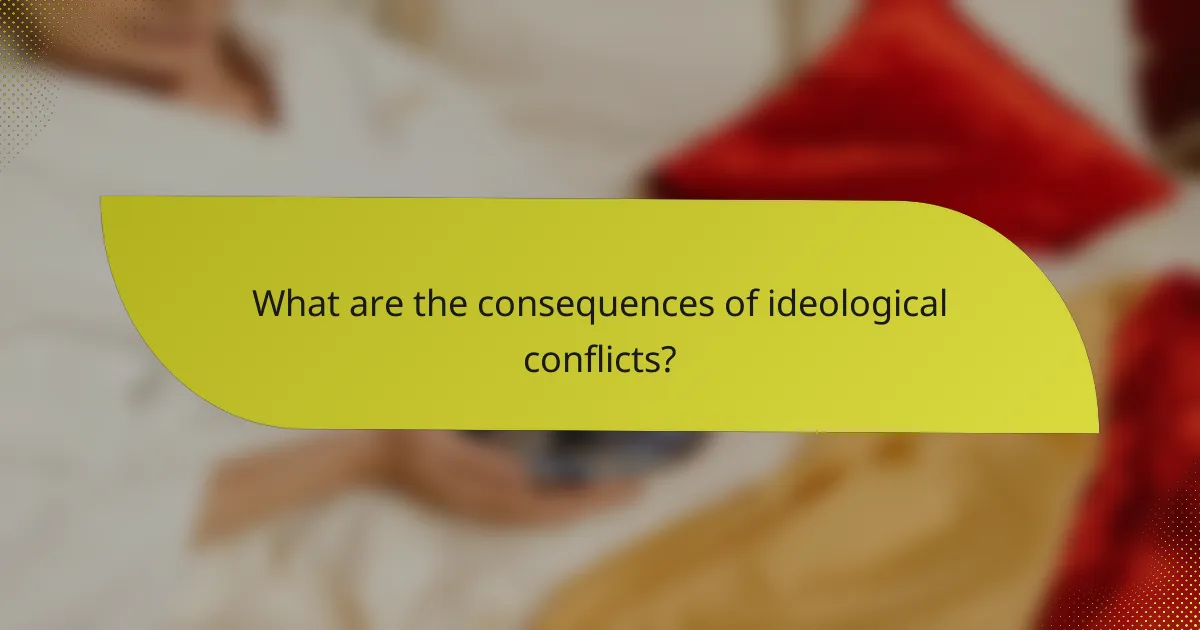
What are the consequences of ideological conflicts?
Ideological conflicts can lead to significant geopolitical tensions, affecting international relations, causing humanitarian crises, and prompting economic sanctions. These consequences often create a cycle of instability that can have lasting effects on nations and their populations.
Impact on international relations
Ideological conflicts can severely strain diplomatic ties between countries. When nations hold opposing beliefs, it can lead to mistrust, reduced cooperation, and increased hostility, complicating negotiations on various global issues.
For example, the ideological divide between democratic and authoritarian regimes often results in polarized alliances, where countries align based on shared beliefs rather than strategic interests. This polarization can hinder collective action on pressing global challenges such as climate change or terrorism.
Humanitarian crises resulting from disputes
Conflicts driven by ideological differences frequently result in humanitarian crises, including mass displacement, famine, and violence against civilians. These crises can escalate quickly, leading to significant loss of life and suffering.
For instance, ideological struggles in regions like the Middle East have led to prolonged conflicts, displacing millions and creating urgent needs for humanitarian assistance. The international community often faces challenges in providing aid due to security concerns and political complexities.
Economic sanctions and their effects
Economic sanctions are a common response to ideological conflicts, aiming to pressure governments to change their policies. These sanctions can include trade restrictions, asset freezes, and financial penalties, which can severely impact a nation’s economy.
Countries under sanctions may experience significant declines in GDP, increased inflation, and shortages of essential goods. For example, sanctions imposed on North Korea have led to widespread economic hardship, affecting the civilian population more than the intended political targets.
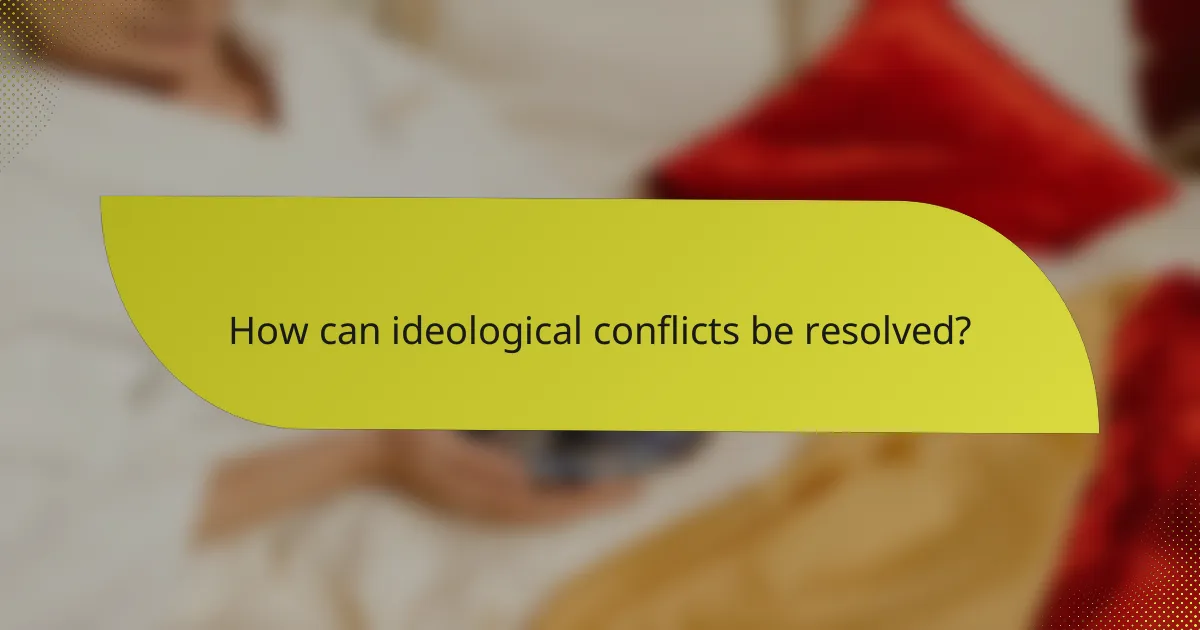
How can ideological conflicts be resolved?
Ideological conflicts can be resolved through a combination of diplomatic negotiations, mediation by international organizations, and initiatives that promote cultural understanding. These approaches aim to address the underlying issues and foster cooperation among conflicting parties.
Diplomatic negotiations as a solution
Diplomatic negotiations involve direct discussions between conflicting parties to reach a mutually acceptable agreement. This process often requires skilled negotiators who can facilitate dialogue and identify common ground. Successful negotiations may include compromises on key issues, which can help de-escalate tensions.
For example, peace talks between nations or groups with opposing ideologies often focus on specific areas of contention, such as territorial disputes or resource sharing. Establishing a timeline for negotiations and setting clear objectives can enhance the likelihood of a successful outcome.
Role of international organizations in mediation
International organizations, such as the United Nations or regional bodies like the European Union, play a crucial role in mediating ideological conflicts. They provide a neutral platform for dialogue and can facilitate discussions by offering resources, expertise, and legitimacy to the negotiation process.
These organizations may also deploy peacekeeping missions or observer teams to monitor compliance with agreements. Their involvement can help build trust among conflicting parties and ensure that commitments are upheld, reducing the risk of renewed tensions.
Promoting cultural understanding and tolerance
Promoting cultural understanding and tolerance is essential for resolving ideological conflicts. Initiatives that foster dialogue between different cultural or ideological groups can help break down stereotypes and build empathy. Educational programs, cultural exchanges, and community engagement activities are effective tools in this regard.
For instance, joint projects that involve collaboration between diverse groups can create shared experiences and foster mutual respect. Encouraging open discussions about beliefs and values can also help individuals recognize commonalities, paving the way for more peaceful coexistence.
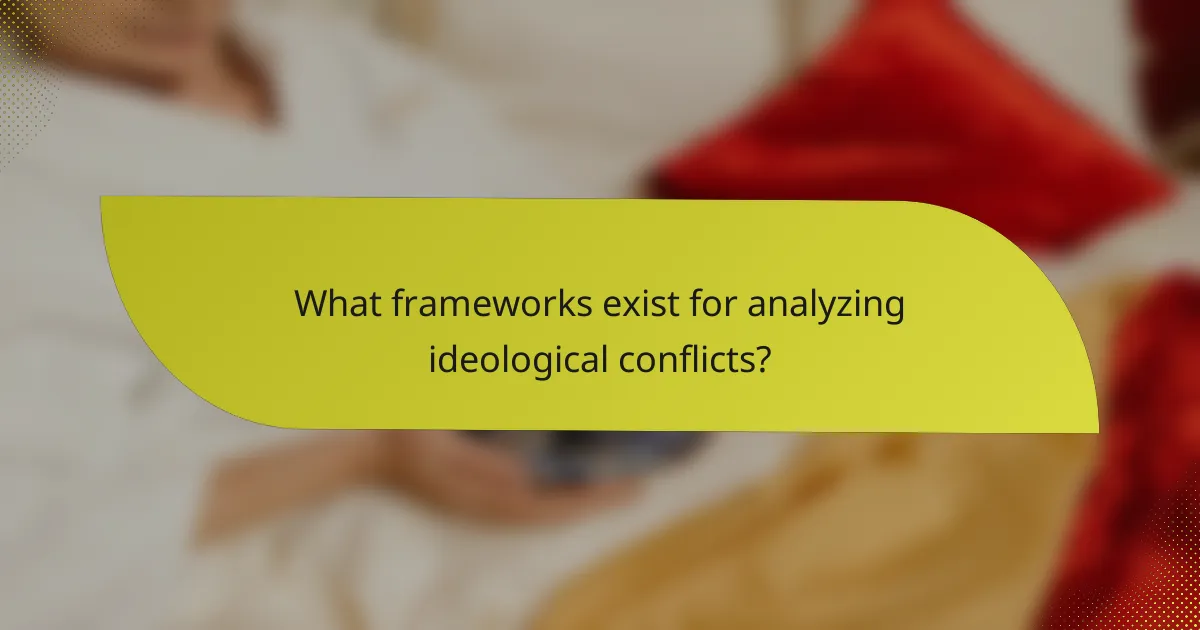
What frameworks exist for analyzing ideological conflicts?
Several frameworks help analyze ideological conflicts, focusing on the underlying beliefs and values that drive disputes. These frameworks provide structured approaches to understanding the motivations and dynamics of conflicting parties.
Conflict resolution frameworks
Conflict resolution frameworks are systematic approaches designed to address and resolve ideological disputes. They often involve negotiation, mediation, and dialogue to facilitate understanding and compromise between conflicting parties.
One common framework is the Interest-Based Relational Approach, which emphasizes the importance of maintaining relationships while addressing the interests of each party. This method encourages open communication and seeks to identify common ground, making it particularly effective in ideological conflicts where personal beliefs are deeply held.
Another notable framework is the Transformative Mediation model, which focuses on empowering individuals and fostering mutual recognition. This approach not only aims to resolve the immediate conflict but also seeks to transform the relationship dynamics, which can lead to long-term peace and understanding. Practitioners should be aware of the emotional aspects involved and strive to create a safe environment for dialogue.
